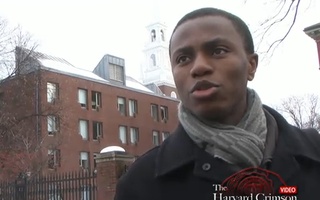
Jack K., a third year student at the Law School, cannot serve in the military despite the repeal of "Don't Ask, Don't Tell" because he is a trans man.
(Part II of this series appeared May 11. Part III appeared May 13.)
Jack K., a third year student at Harvard Law School, dreams of serving in the military again.
One week each fall, members of the Judge Advocate General’s Corps visit Harvard Law School to recruit its next crop of military lawyers. For Jack, it’s one of the most difficult weeks of the year.
Despite his past military service, Jack is not eligible for JAG because he is a trans man. Since his honorable discharge in 2007, Jack, who insisted on his last name not being included in this story to prevent potential workplace discrimination, has undergone sex-change surgery, having had top surgery to remove his breasts.
The military considers those with gender identity disorder, the medical diagnosis associated with transgender persons, and those who have physically transitioned unfit for service. Sidelined by military medical policy, he must watch while his peers compete for his career of choice.
LGBTQ-identified individuals have long been excluded from openly serving in the American military, but with the repeal of “Don’t Ask, Don’t Tell” last fall, gays, lesbians, and bisexuals are now permitted to serve without the risk of being discharged on the basis of their sexual orientation.
Despite this landmark advance in gay rights, transgender men and women like Jack are still ineligible for military service as their exclusion is based on the Department of Defense’s medical policy. Meanwhile at Harvard, the repeal of “Don’t Ask, Don’t Tell” has brought about the return of the Reserve Officers’ Training Corps, but the University has been largely deaf to arguments that while the military continues to prevent trans-identified men and women, the program’s presence on campus violates its non-discrimination policy.
Some defenders of the University’s decision say that allowing gays and lesbians to openly serve in the military represents a historic step forward that warrants Harvard’s recognition, justifying the exclusion of what is seen as a small minority. Jack is a member of that minority, and until military policy changes, his dreams of serving in the military are likely to remain deferred.
TRANSITION
Jack was rushing toward the ground, the wind howling around him. Like many times before, he had just hurled himself from an airplane. But this time he was descending right above his fellow paratrooper’s parachute. The only thing between Jack and the ground rushing up at him was the parachute of the trooper below him.
“I was coming down on their parachute, which is not good because their parachute would be taking all the air from mine and I would have to pull my reserve,” Jack says. “But I had been trained what to do. We’re taught to run on and off the other person’s parachute to move away, so I ran on their chute.”
Jack, who trained as a medic and attended airborne school at Fort Benning in Georgia, says joining the military was a lifelong dream. After graduating from the University of Nebraska in 2006, Jack considered entering the job market or pursuing another degree, but chose to enlist in the Army.
“I got trained to jump out of airplanes. It was very fun.” Jack says, smiling to himself. His tone is regretful and nostalgic. Sitting in the student center at the Law School, Jack wears a blue pin-striped button down, jeans, and loafers. His short hair is spiked up in the front, pushing his bangs off his lightly freckled forehead. His eyes are soft and keen. His manner is easy. Since childhood, Jack has had a keen interest in the military.
“When I was growing up I was really into playing war games, playing soldier,” Jack says. “I remember being eight years old and checking out books from the library about the military.”
As a child, he was particularly fascinated by aviation.
Read more in News
Harvard To Buy Back $300 Million of BondsRecommended Articles
-
 The Return of ROTC
The Return of ROTC -
 ROTC Faces Uphill Battle
ROTC Faces Uphill Battle -
Activists Say Military's Policy Remains BiasedThe Harvard Trans Task Force (TTF) is circulating an online petition protesting the possible return of the Reserve Officers’ Training Corps before the military allows trans-identified and intersex individuals to openly serve in the military.
-
 Dems Open to ROTC Return
Dems Open to ROTC Return -
ACTA Advocates for ROTC RecognitionThe American Council of Trustees and Alumni has submitted a letter to the Harvard Corporation urging the University to recognize the Reserve Officers’ Training Corps.
-
 Harvard Signs Agreement To Officially Recognize Naval ROTC
Harvard Signs Agreement To Officially Recognize Naval ROTC













